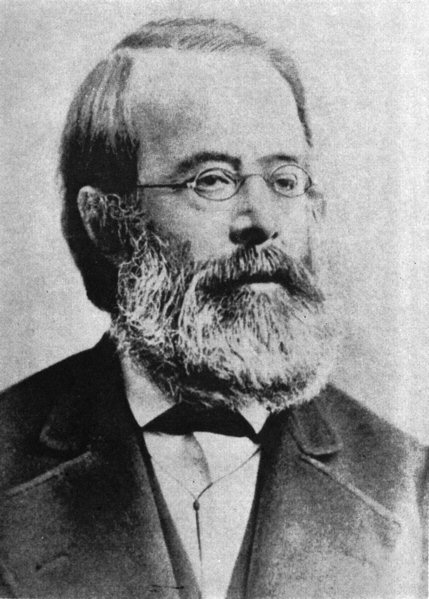|
Otto Von Böhtlingk
Otto von Böhtlingk (russian: Оттон Николаевич Бётлингк, ''Otton Nikolayevich Byotlingk''; 30 May 1815 – 1 April 1904) was a Russian-German Indologist and Sanskrit scholar. His ''magnum opus'' was a Sanskrit-German dictionary. Biography He was born in Saint Petersburg, Russia. His German ancestors migrated to Russia from Lübeck in 1713. Having studied (1833–1835) Oriental languages, particularly Arabic, Persian and Sanskrit, at the University of Saint Petersburg, he continued his studies in Germany, first in Berlin and then (1839–1842) in Bonn. Returning to Saint Petersburg in 1842, he was attached to the Royal Academy of Sciences, and was elected an ordinary member of that society in 1855. In 1860 he was made Russian state councillor, and later privy councillor with a title of nobility. In 1862, the American Philosophical Society elected him an international Member. In 1868 he settled at Jena, and in 1885 moved to Leipzig, where he resided until ... [...More Info...] [...Related Items...] OR: [Wikipedia] [Google] [Baidu] |
Grammar
In linguistics, the grammar of a natural language is its set of structure, structural constraints on speakers' or writers' composition of clause (linguistics), clauses, phrases, and words. The term can also refer to the study of such constraints, a field that includes domains such as phonology, morphology (linguistics), morphology, and syntax, often complemented by phonetics, semantics, and pragmatics. There are currently two different approaches to the study of grammar: traditional grammar and Grammar#Theoretical frameworks, theoretical grammar. Fluency, Fluent speakers of a variety (linguistics), language variety or ''lect'' have effectively internalized these constraints, the vast majority of which – at least in the case of one's First language, native language(s) – are language acquisition, acquired not by conscious study or language teaching, instruction but by hearing other speakers. Much of this internalization occurs during early childhood; learning a language later ... [...More Info...] [...Related Items...] OR: [Wikipedia] [Google] [Baidu] |
Vedic Accent
The pitch accent of Vedic Sanskrit, or Vedic accent for brevity, is traditionally divided by Sanskrit grammarians into three qualities, ''udātta'' उदात्त "raised" (acute accent, high pitch), ''anudātta'' अनुदात्त "not raised" (from अ(न्)- ( negative prefix) + उदात्त) (unstressed, or low pitch, grave accent) and ''svarita'' स्वरित "sounded" (high falling pitch, corresponds to the Greek circumflex accent). It is most similar to the pitch-accent system of modern-day Japanese. Accents In Vedic Sanskrit, most of the words have one accented syllable, which is traditionally called ''udātta'' ("raised") and written with an acute mark in the transcription. The position of that accent in inherited words generally reflects the position of Proto-Indo-European accent, which means it was ''free'' and so not phonologically predictable from the shape of the word. Some words (finite verbs of main clauses, vocatives that do not occur sent ... [...More Info...] [...Related Items...] OR: [Wikipedia] [Google] [Baidu] |
Albrecht Weber
Friedrich Albrecht Weber (; 17 February 1825 – 30 November 1901) was a Prussian - German Indologist and historian who studied the history of Jainism in India. Some older sources have the first and middle names interchanged. Weber was born in Breslau, where his father Friedrich Benedict Weber was a professor of political economy. The protestant family had roots in Schleusingen where ancestors had held clerical posts. Weber studied Greek, Latin and Hebrew in Thüringen. He then sought to become a historian and went to the University of Breslau. He studied Arabic under Hinrich Middeldorpf and Sanskrit under Adolf Friedrich Stenzler (1807–1887). In 1844, he spent two semester in Bonn attending classes under Christian Lassen and Johannes Gildemeister. At Stenzler's suggestion, he studied the Yajurveda, examining the ninth chapter of the Vâjasaneyi-Samhitâ from a copy in London. He also spent some time in 1845 in Berlin studying under Franz Bopp, H. J. Petermann, Wilhelm Schot ... [...More Info...] [...Related Items...] OR: [Wikipedia] [Google] [Baidu] |
Rudolf Roth
Rudolf von Roth (born Walter Rudolph Roth, 3 April 1821 – 23 June 1895) was a German Indologist, founder of the Vedic philology. His chief work is a monumental Sanskrit dictionary, compiled in collaboration with Otto von Böhtlingk. Biography Roth was born in Stuttgart and educated at the universities of Tübingen and Berlin. He continued his studies in Paris and London, and in 1848 was appointed as extraordinary professor of Oriental languages in Tübingen University, becoming a full professor and principal librarian in 1856. He died in 1895 in Tübingen. Works His chief work is the monumental ''Sanskrit Wörterbuch'' (Sanskrit dictionary, 7 vols., Saint Petersburg, 1853–1895), compiled in collaboration with Otto von Böhtlingk and published by the Saint Petersburg Academy of Sciences. He edited Yaska's ''Nirukta'' (1852) and, with Whitney, the ''Atharva Veda'' (1856–1857). A list of Roth's main writings, and further sources on his life and work, can be found in the artic ... [...More Info...] [...Related Items...] OR: [Wikipedia] [Google] [Baidu] |
Brihadaranyaka
The ''Brihadaranyaka Upanishad'' ( sa, बृहदारण्यक उपनिषद्, ) is one of the Principal Upanishads and one of the first Upanishadic scriptures of Hinduism. A key scripture to various schools of Hinduism, the ''Brihadaranyaka Upanisad'' is tenth in the Muktikā or "canon of 108 Upanishads". The ''Brihadaranyaka Upanishad'' is estimated to have been composed about 7th-6th century BCE, excluding some parts estimated to have been composed after the ''Chandogya Upanishad''. The Sanskrit language text is contained within the ''Shatapatha Brahmana'', which is itself a part of the Shukla Yajur Veda. The ''Brihadaranyaka Upanishad'' is a treatise on Ātman (Self), includes passages on metaphysics, ethics and a yearning for knowledge that influenced various Indian religions, ancient and medieval scholars, and attracted secondary works such as those by Adi Shankara and Madhvacharya. Chronology The chronology of ''Brihadaranyaka Upanishad'', like other Upa ... [...More Info...] [...Related Items...] OR: [Wikipedia] [Google] [Baidu] |
Upanishad
The Upanishads (; sa, उपनिषद् ) are late Vedic Sanskrit texts that supplied the basis of later Hindu philosophy.Wendy Doniger (1990), ''Textual Sources for the Study of Hinduism'', 1st Edition, University of Chicago Press, , pages 2-3; Quote: "The Upanishads supply the basis of later Hindu philosophy; they are widely known and quoted by most well-educated Hindus, and their central ideas have also become a part of the spiritual arsenal of rank-and-file Hindus." They are the most recent part of the Vedas, the oldest scriptures of Hinduism, and deal with meditation, philosophy, consciousness, and ontological knowledge; earlier parts of the Vedas deal with mantras, benedictions, rituals, ceremonies, and sacrifices.Gavin Flood (1996), ''An Introduction to Hinduism'', Cambridge University Press, , pp. 35–39A Bhattacharya (2006), ''Hindu Dharma: Introduction to Scriptures and Theology'', , pp. 8–14; George M. Williams (2003), Handbook of Hindu Mythology, Oxford Un ... [...More Info...] [...Related Items...] OR: [Wikipedia] [Google] [Baidu] |
Chandogya
The ''Chandogya Upanishad'' (Sanskrit: , IAST: ''Chāndogyopaniṣad'') is a Sanskrit text embedded in the Chandogya Brahmana of the Sama Veda of Hinduism.Patrick Olivelle (2014), ''The Early Upanishads'', Oxford University Press; , pp. 166-169 It is one of the oldest Upanishads. It lists as number 9 in the Muktika canon of 108 Upanishads. The Upanishad belongs to the ''Tandya'' school of the Samaveda. Like ''Brihadaranyaka Upanishad'', the Chandogya is an anthology of texts that must have pre-existed as separate texts, and were edited into a larger text by one or more ancient Indian scholars. The precise chronology of ''Chandogya Upanishad'' is uncertain, and it is variously dated to have been composed by the 8th to 6th century BCE in India. It is one of the largest Upanishadic compilations, and has eight ''Prapathakas'' (literally lectures, chapters), each with many volumes, and each volume contains many verses. The volumes are a motley collection of stories and themes. As ... [...More Info...] [...Related Items...] OR: [Wikipedia] [Google] [Baidu] |
Yakuts
The Yakuts, or the Sakha ( sah, саха, ; , ), are a Turkic ethnic group who mainly live in the Republic of Sakha in the Russian Federation, with some extending to the Amur, Magadan, Sakhalin regions, and the Taymyr and Evenk Districts of the Krasnoyarsk region. The Yakut language belongs to the Siberian branch of the Turkic languages. The Russian word was taken from Evenk . The Yakuts call themselves , or (Yakut: Уран Саха, ''Uran Sakha'') in some old chronicles. Origin Early scholarship An early work on the Yakut ethnogenesis was drafted by the Russian Collegiate Assessors I. Evers and S. Gornovsky in the late 18th century. At an unspecified time in the past certain tribes resided around the western shore of the Aral Sea. These peoples later migrated eastward and settled near the Tunka Goltsy mountains of modern Buryatia. Pressure from the expansionist Mongolian Empire later made many of those around the Tunka Goltsy relocate to the Lena River. Several add ... [...More Info...] [...Related Items...] OR: [Wikipedia] [Google] [Baidu] |
Franz Bopp
Franz Bopp (; 14 September 1791 – 23 October 1867) was a German linguist known for extensive and pioneering comparative work on Indo-European languages. Early life Bopp was born in Mainz, but the political disarray in the Republic of Mainz caused his parents' move to Aschaffenburg, the second seat of the Archbishop of Mainz. There he received a liberal education at the Lyceum and Karl Joseph Hieronymus Windischmann drew his attention to the languages and literature of the East. (Windischmann, along with Georg Friedrich Creuzer, Joseph Görres, and the brothers Schlegel, expressed great enthusiasm for Indian wisdom and philosophy.) Moreover, Karl Wilhelm Friedrich von Schlegel's book, ''Über die Sprache und Weisheit der Indier'' (''On the Speech and Wisdom of the Indians'', Heidelberg, 1808), had just begun to exert a powerful influence on the minds of German philosophers and historians, and stimulated Bopp's interest in the sacred language of the Hindus. Career In 1812, ... [...More Info...] [...Related Items...] OR: [Wikipedia] [Google] [Baidu] |




.png)
